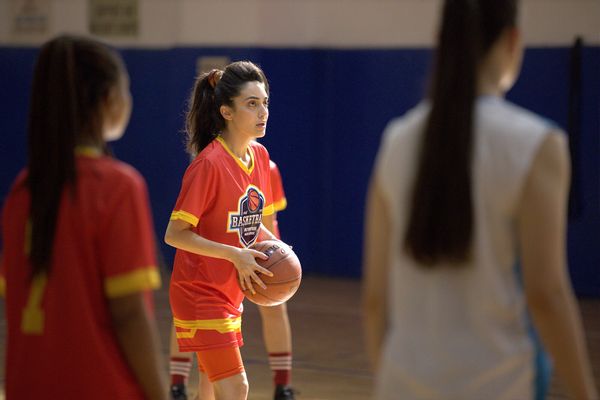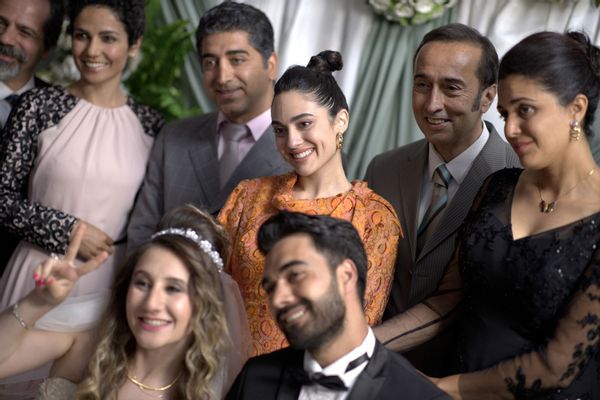“The Persian Version” director on creating a film that is “playful in terms of sexuality”
Based on a true story . . . sort of, “The Persian Version” is writer/director Maryam Keshavarz’s lively comedy-drama about Leila (Layla Mohammadi), a filmmaker, struggling with personal and professional issues. The film is narrated by Leila, who describes growing up in Iran and America, “two countries that used to be in love with each other.” Leila also used to be in love with her wife, Elena (Mia Foo), but they have divorced. Leila’s romantic situation gets complicated when she has a one-night stand with Maximillian (Tom Byrne) and later finds herself pregnant. Leila is also dealing with family issues as her father, Ali Reza (Bijan Daneshmand) needs a heart transplant. Leila wants to provide support but she and her mother, Shireen (Niousha Noor) have a rocky relationship. Leila is closer with her eight brothers, who tease her lovingly, as well as her grandmother, Mamanjoon (Bella Warda), who offers her guidance.
“As women, if we are not difficult, we are crushed.”
“The Persian Version” chronicles all of these experiences and more — there is a critical subplot involving a scandal in the family history — in ways that illuminate the tensions between cultures, genders, sexuality and families. Keshavarz also loves to play with style, employing magical realism and animation as well as including some dance sequences and musical numbers (there is even an appearance by the popular Iranian singer, Googoosh).
Leila’s story is both funny and heartwarming as she tries to reconcile her relationship with her mother. Keshavarz spoke with Salon about making “The Persian Version.”
There is a line in the film, “If you want to understand your mother, write about her.” What did you come to understand about your mother writing “The Persian Version”?
It’s mostly autobiographical. I had to think about her life from her shoes. When Leila’s grandmother says that, it is imploring Leila to be empathetic, and not to think of her mother in the present tense, but to think of her as a 14-year-old and what that meant. That really shifted my brain to think of her at that moment. I realized that my mother came to America to rewrite her life. I knew my mother had to be one of the narrators. The process of writing my mother has been very healing in terms of understanding our family’s trauma, and naming it, and being able to move on from it.
What are her thoughts on how you present her? Shireen says about Leila mining their relationship for her art, “You do this to hurt me?”
Which is actually what she said at Sundance! [Laughs]
My Jewish mother could say that! There is a terrific sequence where you show Shireen as a master multitasker, getting her GED and real estate license and selling homes to immigrant families. It illustrates her ambition and determination as well as her stubbornness, qualities both she and Leila share. I often think, “I’ve become my mother!” What observations do you have about presenting her?
Regardless of gender, we do become our parents. We inherit so much of not only who they are, but the fears they have. Leila inadvertently becomes her mother, and she has to understand her that from her point of view. It was important for me — and I got into a big fight with someone on our team — that the mother is quite unlikable in the beginning. She wholeheartedly rejects her daughter and is cruel to her the first time we see her in a scene with her daughter. That’s kind of the point. We start with a character we don’t like, and we judge her, and then the film slowly peels back all the layers, and not only do we understand her, but we embrace her by the end.
One thing I wanted to do with this film, is that we are in a very divisive time right now, and we judge people very readily by a thought they have or something they have said. This is a challenge we have, to understand the people we find unknowable or that we reject for whatever reason — be it their sexuality or their politics. I challenge the audience to go beyond the surface. It’s complicated.
Can you talk about depicting the cultural issues in the film and the old world/new world issues? There is a very important sequence in Iran that informs the family’s life in America.
This is the story of so many immigrants. I identify as Iranian. I grew up speaking Persian and went to Iran. I made a film about Iran. I got banned by Iran! I am someone who is very connected to my culture, but it is quite a battle between the new world and the old world. My parents came in 1967 from Iran and they wanted to preserve our culture. Everyone I interacted with as a kid was Persian. I have the cultural mores of 1967. To preserve the old world, they freeze it, and don’t allow it to develop. It becomes one of the tensions of immigrants — we have to preserve our culture. And here I am trying to learn to be American by watching sitcoms and films, and here I am pushing my family to adapt to this country and for culture to evolve and not be stolid. Can we embrace this culture where we have new mores? There has to be a way to connect those two, and it is an age-old struggle. We all face this. Culture changes depending on the political and social situation.
 The Persian Version (Sony Pictures Classics)What about the representations of gender and sexuality in the film? You show how women are oppressed in both countries.
The Persian Version (Sony Pictures Classics)What about the representations of gender and sexuality in the film? You show how women are oppressed in both countries.
Do you like how confusing my family always is with my sexuality? We thought you were gay! Who’s this gay guy? I’m a very confusing human being. Sexuality is very much on a continuum. Not everything falls into straight identity issues. You can identify as queer and sleep with someone as a lesbian and become pregnant and navigate a whole new life. The film is playful in terms of sexuality. Who does she have the one-night stand with? Hedwig, a man who looks really hot as a woman. I am playing with sexuality, attraction and identity politics. We can’t always be put in a box.
The ideas about gender were also interesting. Leila has to clean the house or cook for her eight older brothers. And Leila is the basketball player whose brother who is a cheerleader.
That’s actually true! My twin was a cheerleader. My parents were so damned confused. “We just don’t get America!” That is very realistic. But also, some of the gender stuff of what the mother went through in Iran, and here in America, that her daughter has all these opportunities that she never had. But she also has some of that oppression, too, because she is a girl. Is it because she’s a girl or because the mother really relies on her? My mother says because I was the only daughter, I was the only one she could trust. Because of our family history, there was so much meaning in her having a girl. It was a healing process. It was complicated. My mom felt much closer to me.
Even though she treated you more harshly than your brothers.
Yeah. [Laughs]. All of my films, “Circumstance,” Susan Sarandon in “Viper Club,” are about women who don’t fit the status quo and fight against society. The mother in this film fights against society. She doesn’t want to get married. Even when she gets married, she fights to change her life and become the narrator of her own story and becomes successful and leads the family. She essentially says, “I’m not going to be who you think I’m going to be. I am going to be the person I want to be.” That stubbornness, much to her dismay, is instilled in her own daughter. I often say to my mother, “Oh, you have problems with me? Well, you taught me to be this way!” And my daughter says this to me! I tell her, “Oh, my God, you are so difficult!” She says, “You raised me to be difficult!” “Well, you got me!” [laughs] As women, if we are not difficult, we are crushed. Being in America or Iran, it is not easy to be a woman. The Persian Version (Sony Pictures Classics)There are several plotlines that deal with issues of shame in the film. Leila says that she and her mom are too proud to fail. Can you talk about this model minority concept in the film, and pulling oneself up from their bootstraps?
The Persian Version (Sony Pictures Classics)There are several plotlines that deal with issues of shame in the film. Leila says that she and her mom are too proud to fail. Can you talk about this model minority concept in the film, and pulling oneself up from their bootstraps?
That is something I’ve learned — that resilience. I try to instill that in my daughter, but her generation does not accept this concept of pulling up from my bootstraps. She wholeheartedly rejects that system because it is oppressive. Our generation is fighting the status quo and the patriarchy and show how exceptional we are. I am the exceptional immigrant or exceptional woman. My daughter doesn’t engage in that and questions the whole concept of system.
I liked the articulation of silence being a position of strength in Leila’s relationship with Shireen, as well as a form of sadness. Can you talk about “pain not touching you if you do not talk about it”? I thought that was really moving.
“Breaking the fourth wall is the power of the narrator.”
It’s so interesting, right? We live in a culture of confessions — going to therapy. There is this concept if we talk about it, you are better and healed from it. I thought this idea with my mother of silence was so interesting. Some people might say silence is repression and putting your trauma in a box and not allowing it to infect your life. It’s a question of philosophy. I do this myself. You put things in a box, and you acknowledge these things exist, but you refuse to let them infect every element of how you see the world. To do that means you are left hopeless.
It is an individual thing, maybe, or maybe something you do with family traumas. But it is something I do to feel comfortable.
What decisions did you make about using metatextual qualities and visual style and using direct address and other gimmicks to hold the viewer’s hand through the film? The film is also very busy with characters, dances scenes, and background action.
I knew it was a comedy, and I wanted to be playful. You have to contextualize things for the audience, and I wanted to do it in a funny way. I knew I had to break the fourth wall. I had written it that way. Everyone tried to convince me that it was risky. The danger is you alienate audience, and they can’t get into the story. But then I saw “Fleabag” Season 1 and I felt she did it in such a clever way; it brought us closer — that she had a little secret to tell you. When I saw that I knew it could work. The story is important on its own, but it did need some level of contextualization for the audience.
When I realized my mother is my cowriter, and this is the structure, I knew the mother had to also take part. In the first part of the film, only the daughter breaks the fourth wall. Then we give that gift, that ability, to the mother and she does it as a young woman and one other time as an adult. It is a technique that gives you sense of power. Breaking the fourth wall is the power of the narrator. It is held in Leila’s hands very squarely until the mother demands that she also be a narrator. I wanted to use that technique as a way for us to understand the three generations of women who each narrate their own version. All three versions of the story — the daughter, the mother and the grandmother are told stylistically differently. The daughter is pop ’80s/’90s, the grandmother, who tells tall tales as many grandmothers do, is a spaghetti western, and the mother, who is still traumatized by Iran, is a neorealist Kiarostami film. The style reflects different narrators.
This is your most personal film. What do you think makes your story universal?
I think it is universal in its specificity. I based it on my Iranian Muslim New York-based family.
No matter who your family is, a lot of times, you feel like an outsider, and you have to navigate what that feels like. You still love your family, but you don’t know how to deal with them. This feeling of being the outsider and still connected to them is something you feel when you come from two cultures, if you are an artist, or if you are gay. For so many different reasons, we all feel that. In the end, we all have parents, and difficult mothers, and crazy siblings. We might not have children, but we certainly have parents, so those elements make it universal.
Want a daily wrap-up of all the news and commentary Salon has to offer? Subscribe to our morning newsletter, Crash Course.
Also, I never saw these images growing up. I longed so deeply to see that. The only thing vaguely like my family was “The Joy Luck Club” or “Mississippi Masala” or Ang Lee’s “Eat, Drink, Man, Woman” or “The Wedding Banquet.” We were always so vilified like we were terrorists. These images were not reflective of the experience I had as an immigrant. I selfishly made the film I always wanted to see. The things I always wanted to see of our communities. After Trump took office, and we had all that xenophobia, I felt I had a duty to show some fun and humanity and make you feel connected. The same people you see in the Muslim ban are the same people you might have fun with and think they are a cool, crazy family.
“The Persian Version” opens in select theatres Oct. 20, expanding to additional cities on Oct. 27 and nationwide Nov. 3.
Read more
movie interviews by Gary Kramer


